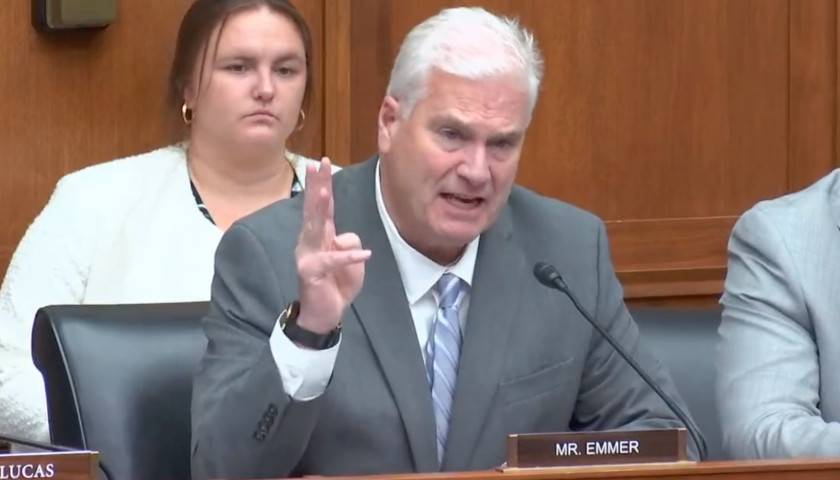by Anthony Gockowski
U.S. Rep. Tom Emmer has reintroduced legislation that would ban the Federal Reserve from issuing a central bank digital currency (CBDC), which the majority whip described as a potential threat to the “American way of life.”
As the Biden administration explores the possibility of developing a digital dollar, Emmer said the idea could dismantle “Americans’ right to financial privacy.”
“The administration has made it clear: President Biden is willing to compromise the American people’s right to financial privacy for a surveillance-style CBDC,” Emmer said. “If not designed to be open, permissionless, and private — emulating cash — a government-issued CBDC is nothing more than a CCP-style surveillance tool that would be used to undermine the American way of life.”
Emmer’s “CBDC Anti-Surveillance State Act” would prohibit the Federal Reserve from issuing a CBDC directly to individuals, indirectly issuing a CBDC to individuals through an intermediary, or using any CBDC to implement monetary policy, his office said.
“Two world visions for the future of digital currencies are in conflict: China and a Central Bank Digital Currency (CBDC) where government creates digital assets and surveils, spies, monitors, and restricts consumer behavior versus an American free marketplace that enables private competition that protects consumer data, allows economic freedom, enables innovation, and encourages competition,” commented David McIntosh, president of Club for Growth.
So what exactly is a CBDC? Emmer’s office explained it this way: “Unlike decentralized cryptocurrencies, like Bitcoin, a CBDC is a digital form of sovereign currency that is designed and issued by a government and transacts on a digital ledger that is controlled by that government. In short, a CBDC is government-controlled programmable money that, if not designed to emulate cash, could give the federal government the ability to surveil Americans’ transactions and choke out politically unpopular activity.”
A government tool for financial surveillance is un-American.
We must urgently develop a digital financial system that is (1) open and freely accessible to all, (2) without requiring permission from the government or anyone else, and (3) private, safeguarding the user’s identity. pic.twitter.com/KXP9NXj7FK
— Tom Emmer (@GOPMajorityWhip) September 14, 2023
Emmer’s bill is scheduled for a markup in the House Financial Services Committee Wednesday, along with a related “Digital Dollar Pilot Prevention Act” carried by U.S. Rep. Alex Mooney, a Republican from West Virginia.
Republicans believe the Federal Reserve lacks the authority to issue a CBDC without an act of Congress, but pilot programs present a possible loophole to this requirement, according to Mooney’s office.
“Still, the Federal Reserve caught attention late last year for its CBDC pilot projects, even contracting with the private sector to build potential CBDCs for the United States which went beyond traditional research,” his office said in a press release.
“Congress cannot give an inch when it comes to CBDCs. CBDCs would threaten the liberties of law-abiding Americans and are being used by authoritarian countries right now to crack down on dissent,” Mooney added. “That’s why closing this pilot program loophole is so important — to prevent the Federal Reserve from bypassing the will of Congress.”
As more than 100 countries consider CBDCs, the issue has emerged as a popular talking point on the Republican presidential campaign trail, with Florida Gov. Ron DeSantis vowing Tuesday to “ban” any CBDC.
“A CBDC is a massive threat to American liberty. It would allow the federal government to surveil all your purchases and control your accounts. It would pave the way to a CCP-style social credit system,” the presidential candidate wrote on X. “That’s why when I am president, a CBDC is DOA.”
Presidential candidate Vivek Ramaswamy has also expressed opposition to CBDCs, calling them a “clear path to a social credit system.”
– – –
Anthony Gockowski is Editor-in-Chief of Alpha News. He previously worked as an editor for The Minnesota Sun and Campus Reform, and reported for The Daily Caller.




